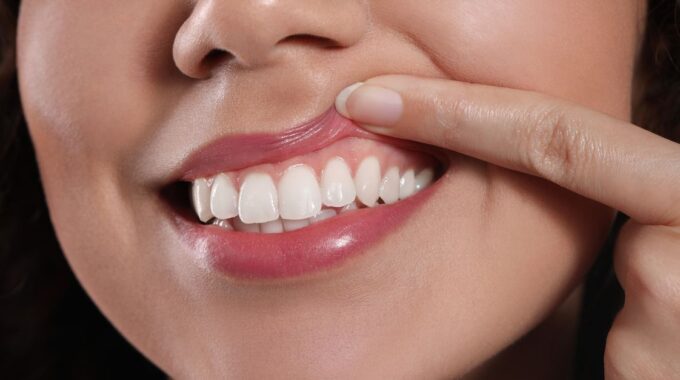Why Your Heart Health Starts in Your Smile The human body is an interconnected structure…

Everything You Need to Know Before Getting Veneers
Updated 10/15/2024
If you’ve ever wished for a brighter, more even smile, you’ve probably heard of veneers. These thin, custom-made shells designed to cover the front of your teeth can completely transform your appearance. But what exactly are veneers, and are they the right choice for you? This guide will walk you through everything — from understanding what veneers are to determining if they’re a smart investment for your smile.
What Are Dental Veneers?
Dental veneers are thin, custom-made shells crafted to cover the front surface of teeth, improving their appearance. They are usually made from porcelain or composite resin and are bonded to the teeth to change their color, shape, size, or length. Veneers are an excellent cosmetic dentistry option for addressing issues like:
– Discoloration that teeth whitening can’t fix
– Chipped, worn, or broken teeth
– Gaps between teeth
– Minor misalignment
Veneers offer a simple, durable way to achieve the smile you’ve always dreamed of.
Benefits of Veneers
Veneers are popular for their ability to address a range of dental imperfections. Veneers will make your smile look perfect. Veneers do this by correcting the shape, size, and color of your teeth. Veneers are durable. Porcelain veneers can last 10-15 years with proper care. Veneers are stain resistant. Porcelain veneers resist stains, making it easier to maintain a white smile. Veneers are generally low maintenance. They require just regular brushing, flossing, and routine dental check-ups.
Types of Veneers
There are two main types of veneers: porcelain veneers and composite veneers.
Porcelain Veneers
Porcelain veneers are highly durable and offer the most natural-looking results. They are custom-made in a dental lab and then bonded to your teeth. Porcelain veneers are durable, lasting 10-15 years with proper care. Porcelain veneers are more stain-resistant than natural teeth.They also have a natural appearance: mimicking the light-reflecting properties of natural teeth, providing a realistic look.
Composite Veneers
Composite veneers are made from a tooth-colored resin and are often applied in a single visit. They tend to be less durable but are a more affordable option. Composite veneers are cost effective; usually less expensive than porcelain veneers. Composite veneers are quick to install. The procedure is often completed in one dental visit. Composite veneers have a shorter lifespan: typically last 5-7 years and are more prone to chipping or staining.
The Veneer Procedure: What to Expect
The process of getting veneers typically involves a few steps over multiple dental visits.
Veneer Consultation
The dentist examines your teeth and discusses your goals. They may take X-rays or impressions.
Tooth Preparation for Veneers
A small amount of enamel (about 0.5 mm) is removed to ensure the veneer fits naturally. Porcelain veneers usually require this, while composite veneers may not.
Temporary Veneers

Temporary veneers may be placed while the permanent ones are custom-made in a lab, usually taking a couple of weeks.
Permanent Veneer Placement
Once ready, the permanent veneers are bonded to your teeth with a strong adhesive.
How Much Do Veneers Cost?
The cost of veneers can vary based on multiple factors, such as the type of material and the complexity of your case.
Porcelain Veneer Cost
$900 to $2,500 per tooth.
Composite veneers
$250 to $1,500 per tooth.
Does Insurance Cover Veneers?
Most dental insurance plans do not cover veneers, as they are considered cosmetic. However, some dentists offer payment plans or financing options to make the procedure more affordable.
Are Veneers Right for You?
Veneers are an excellent solution for many, but not everyone. Good candidates are people with healthy gums, sufficient enamel, and minor cosmetic concerns like discoloration or gaps. You may not qualify for veneers if you have gum disease, severe tooth decay, or bruxism (teeth grinding). These issues may need to be addressed before considering veneers.
Veneer Maintenance and Aftercare
Veneers require little maintenance beyond good oral hygiene. Here are a few tips to ensure they last as long as possible:
Brush twice a day and floss regularly.
Avoid biting hard objects, like fingernails or ice, which can chip veneers.
Visit your dentist regularly to maintain oral health and the integrity of your veneers.
Potential Risks and Downsides
As with any dental procedure, there are risks associated with veneers:
Tooth sensitivity:
You may experience increased sensitivity to hot and cold after getting veneers.
Irreversibility:
Porcelain veneers require enamel removal, which is irreversible. They cannot be removed without replacement.
Replacement costs:
Veneers don’t last forever, so you’ll eventually need replacements, which can be costly.

FAQs About Veneers
Are veneers painful?
No, local anesthesia is used to minimize discomfort during tooth preparation.
Can veneers be whitened?
No, veneers cannot be whitened. The color chosen during placement will remain the same.
How many veneers should I get?
It depends on your smile goals. Some people get just one or two to correct specific teeth, while others opt for six or more to cover all visible teeth.
Should You Purchase Veneers?
Veneers can provide a long-lasting, natural-looking solution for improving your smile. However, they’re a significant investment, so it’s essential to weigh the pros and cons. Consult with a cosmetic dentist to see if veneers are the right option for your smile.
If you’re considering veneers, don’t hesitate to contact us to schedule a consultation and begin your journey to a flawless smile.
Additional Resources
https://www.ncbi.nlm.nih.gov/pmc/articles/PMC6311473/– https://www.ncbi.nlm.nih.gov/pmc/articles/PMC11122289/



